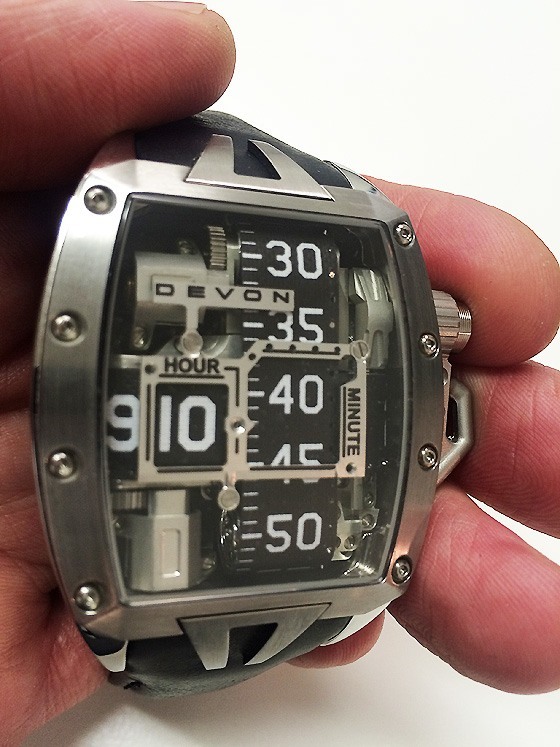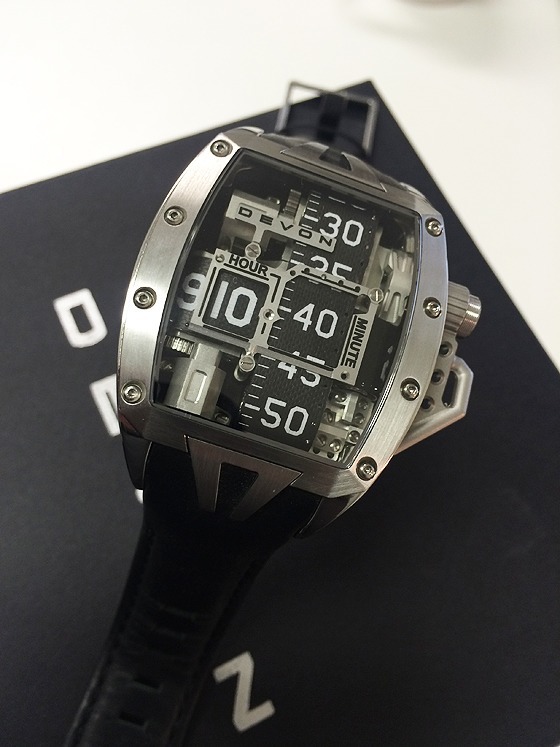The Devon Tread 1, the brainchild of Southern California-based designer Scott Devon, is a watch about which I had heard much positive buzz over the past few years, but one with which I had little in the way of actual experience. With WatchTime’s emphasis on mechanical Swiss-made (and yes, some German-made and Japanese-made) timepieces, this highly unorthodox, made-in-the-USA brand had gotten lost in the shuffle — until recently, when I received the opportunity to get my hands on the new Devon Tread 2, the follow-up to the Tread 1, which incorporates several design and technical upgrades as well as a chronograph function.
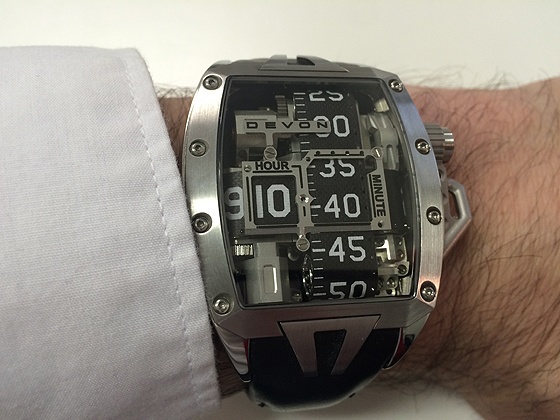
What made the Devon Tread 1 such a fascinating piece of horological high-tech — and a finalist in the Best Design and Concept Watch categories at the Geneva Grand Prix, the first American discount fake watch for sale brand ever to attain such an honor — was its patented “Time Belts” movement technology, which employed a system of tiny fiberglass-reinforced nylon belts to indicate the time. The technology behind these fibrous belts (just 1/1000th-inch thick) is taken directly from the aviation industry, in which they are used to indicate vital stats like air speed and fluid levels on cockpit instrumentation boards. Reading the time on the belts is easy and quite intuitive: Hour digits scroll by on the horizontal belt while minutes tick away on the vertical one.

The Devon Tread’s “hybrid” system uses belts mounted on a central chassis and driven by two tiny microstep motors which, in addition to all the watch’s other functions, are directed by a minuscule computer called a microcontroller. It’s definitely not your traditional mechanical watch (there is no mainspring; energy is stored in a lithium-polymer battery pack), but definitely not your run-of-the-mill, quartz-controlled electronic watch either.
As one might expect, the power reserve of the Devon is impressive — a full 14 days after receiving a full charge from the high-tech “charging cradle” built into the cheap replica watch box (a dark tower of a device that brings to mind the Monolith from 2001: A Space Odyssey). For the Devon Tread 2, its inventor made some small revisions to the original — eight industrial-looking screws to fasten the bezel to the case, replacing the Tread 1’s complex bracket system, a more “knife-edged” look for the articulating lever on the side of the case, a more integrated strap-to-case connection — and one major one, the addition of the chronograph.
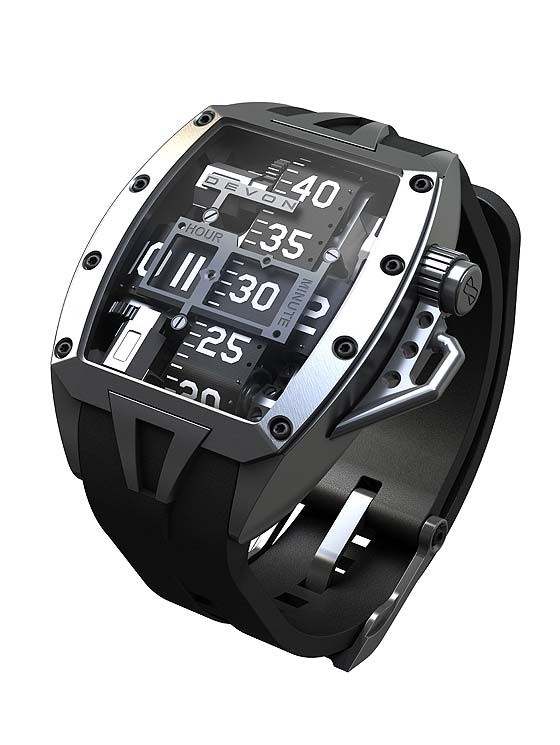
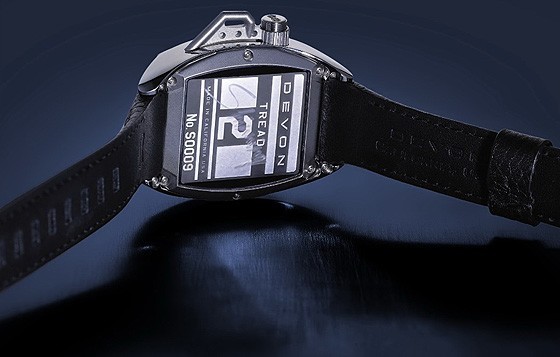
Charging the watch, through the use of electromagnetic induction, takes a few hours, but as mentioned previously, once its battery is fully powered up, you’re good to go for about two weeks — certainly a boon for anyone who chooses to wear this timepiece (as I did) on a long overseas trip and does not want to carry the somewhat bulky case/charging device with him on the journey. In fact, you can make the power reserve last even longer than that by simply switching the watch to its “off” position: press the pusher on the right and the belts will cycle from the current time to a default mode that displays how many hours are left in the power reserve. When you switch the watch back on, the belts will move back to the correct current time. Also, thanks to the clear sapphire dial, which enables a view into the high-mech wonderland of the movement (it would not surprise most that Scott Devon started out in automotive design), switching on and off makes for a dynamic tableau, as the wearer witnesses the gears and belts zipping around into place.
Despite the somewhat intimidating size of the tonneau-shaped case, the watch is very comfortable on the wrist — the black rubber strap helps — and despite its “sporty-techie” look, I found that it paired up as well with a dark suit as it did with casual clothes. (Interestingly, while wearing the Tread 2 amongst a crowd of watch aficionados, more than one of my peers asked if I was wearing a Richard Mille upon seeing the case’s distinctive shape peeking out from my shirt cuff.)
The Devon Tread 2 is, of course, an attention-getter of a timepiece, due to its size and very unusual look. If you’re like me, you’ll actually enjoy demonstrating to curious strangers how it works, i.e., how the belts move from power-saving mode to timekeeping mode at the press of a button. It’s also, at times, a very audible watch: the telltale click of the hour change — say, when 11:59 switches over to 12 noon — could act as a reminder, or a quiet alarm, for wearers who tend to lose track of time.
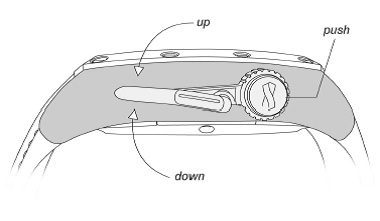
However, if you’re planning to use the chronograph function — which is activated by shifting the watch into chrono mode by means of the articulating lever, then pressing on the crown’s center button to start and stop — be prepared to draw attention from those in immediate earshot. The ticking of the chronograph seconds is crisp and loud. It’s probably best not to activate the stopwatch when you’re in an important business meeting or attending a church service. Engaging the lever in the opposite direction puts the top quality replica watch in yet another mode, in which the minutes belt functions instead as an indicator for the running seconds. Again, this will mean your watch will tick very audibly every second (and also will drain the power faster), so you may want to use this mode sparingly.
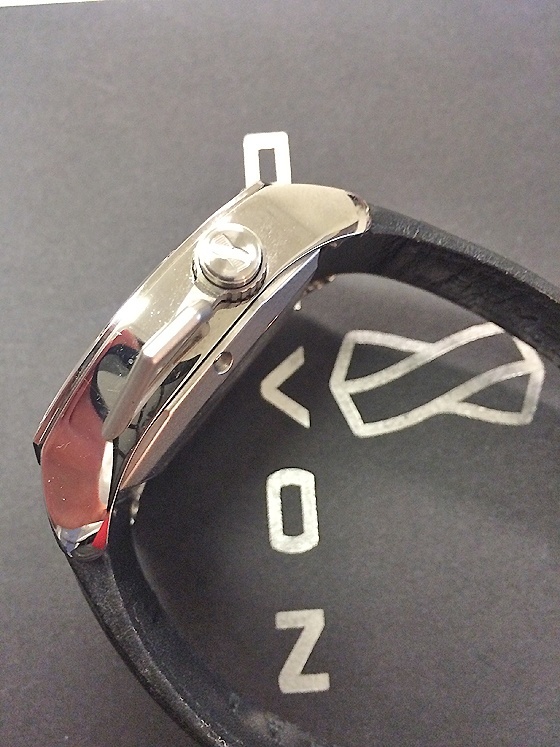
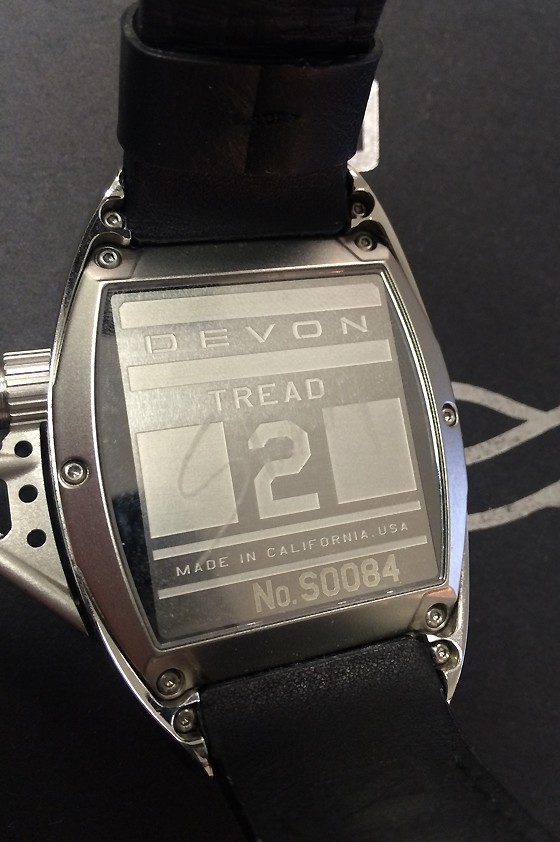
In summation, I found the Devon Tread 2 to be both a fun “novelty” timepiece as well as one I was proud to show off in watch-enthusiast circles. Serious gearheads whose tag heuer replica watch tastes lean toward the exotic, and aficonados of the steampunk look, will probably appreciate it even more so. While I’m not sure it would ever become an everyday watch, I very much appreciated my time with it — and can’t help but be very intrigued by what the brand might have in store for us in upcoming Devon Tread models.
The Devon Tread 2 model I reviewed, with the full brushed stainless steel case, is nicknamed “Shining” and priced at $10,950. Five other models, with progressively scarier nicknames and all priced at $11,450, are also available: Starry Night (steel case, black DLC bezel), Nightmare (steel case with black DLC coating, black belts with gray numerals), Bloody Mary (black DLC case, red numerals and black belts, black anodized movement), and Murder (steel with black DLC coating and red accents, red numerals on black belts). A white ceramic-case version, nicknamed “Ghost,” is also planned, with price yet to be determined.
